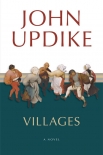Villages by John Updike (best summer reads of all time .TXT) 📗

- Author: John Updike
Book online «Villages by John Updike (best summer reads of all time .TXT) 📗». Author John Updike
While she rendezvoused with Reimann among curving surfaces unto n dimensions, Owen was grinding away at the practical subjects that went into a degree in electrical engineering—power-system analysis, non-linear impedances as power modulators, wide-band amplifiers, photoelectric transducers, insulators, transistors, microwave triodes, reflex klystrons, power relations in an electron beam under small-signal excitation, and such formulas that render invisible electrons visible, audible, and convertible to useful work. One advanced course took Owen for a week to Raytheon in Waltham, and another on repeated visits to the Harvard Computation Laboratory, where Mark I reigned in its lordly bulk and overheated obsolescence. As the Korean police action bogged down in cold and bloody mud, Owen and his schoolmates maintained exemption from the draft by passing a government test only cretins could fail: in the lecture hall called 10-250, at a signal, they presented aloft their pencils like tiny substitute guns. Brains won wars. IBM was enlisting manpower in a massive push to counter Remington Rand’s triumphant UNIVAC; a business market as well as an industrial-military one was dawning for computers. Amid these heady promises of the future, while technical breakthroughs were coming faster than the professors of electrical engineering could teach them, Owen’s overprogrammed neurons began to hum with brain-fatigue. It was like a message emerging from a veil of static when Phyllis, the week after she graduated (her honors thesis, questioning a nuance of Riemannian topology, having been cited for its originality and rigor), said to him, at a table for two in the tiny smoky Indian restaurant, just before he was heading south for another summer surveying with the crew and probing Elsie’s responses, “My parents kept bugging me about what I was going to do with myself now, so I told them I was engaged to you.”
“You did?” His face went hot, abruptly immersed in his life, his only life.
“Well, darling, aren’t we? You’re always talking about it.” Her eyes, with a shade of nervous challenge, sought his.
In trying to persuade her of his devotion he had often imagined aloud their married life together. But he did not remember exactly proposing; he had feared he would be rejected and his hard-won advances into her enchanted terrain negated.
“Well, I guess we are,” he admitted. “That’s thrilling.” What would his mother say? What would Elsie? Well, serve them right. Nature is flux and transformation, MIT had taught him.
vi. Village Sex—III
In his junior year Owen had met her parents a number of times. Their house was on a shady Cambridge street, no doubt once quieter than it had become since rush-hour traffic had discovered it as a short-cut between Garden Street and Mass. Avenue. It was a typical big house on a small lot, with an alarming weight of books everywhere, bookcases even climbing the stairs and filling the hallways of the third floor. The rooms on this third floor had been rented out to Harvard students until five years ago, when Phyllis’s maturing had made the irruption of young males uncomfortable for her parents. Until her young brother, Colin, went off to Andover, he had appropriated one of the previously rented rooms as his lair, adding to the mattress and bureau and yellow-oak desk already there his own little radio of white plastic, a 45-rpm record player, some glue-it-together models of obsolete war machinery, a scattering of faintly redolent sweatshirts and basketball sneakers, and, in several unpainted pine bookcases, a tumble of Batman and Plastic Man comics, science-fiction magazines, paperbacks of baseball stats, Shady Hill textbooks, and a child’s encyclopedia in fifteen volumes whose spines moved through the rainbow from violet to red but were jarringly out of order. Owen’s mother had owned a few books and also borrowed them from the Alton Public Library, travelling in from Willow on the trolley car; in this house books were a monstrous growth, a fungus of reading matter encrusting every surface.
Phyllis was taller than both her parents; the sight of her blushingly towering over them, holding her head at an angle that indicated a wish to shrink lower, Owen found erotic. She was slender but ample-breasted, with abundant dirty-blond down at the nape of her long neck and in her moist places—a hormonally replete body sprung from these two dainty, dry people. Their bodies seemed the last things the senior Goodhues thought of. They dressed almost interchangeably in layers of mousy wool. Mrs., named Carolyn, wore nubbly straight skirts and low brown heels and unbuttoned cardigan sweaters of which one half always hung noticeably lower than the other. Her washed-out coloring and air of distraction linked her to her daughter, but there was an impatience, a habit of interrupting utterances she felt were too slow or obvious, which gentle-spoken Phyllis did not share. “This house—” Owen said, looking about him the first time he entered it, marvelling at the wealth of varnished stickwork, knobs, and moldings, the massive double doors, the walnut-dark staircase forcefully thrusting up to a landing where tall leaded windows cast tinted shadows.
“—has too many books. I know. I keep telling Eustace, but he says they’re his tools, and he never knows which ones he’s going to need. A book can wait untouched for twenty years, and suddenly, in the middle of some dreary scholarly article, he desperately needs it. It’s horrible—think of the dust mites. I try to get the cleaning women to dust them once





Comments (0)